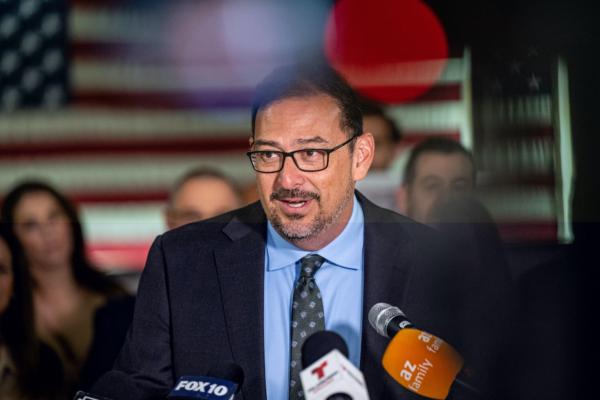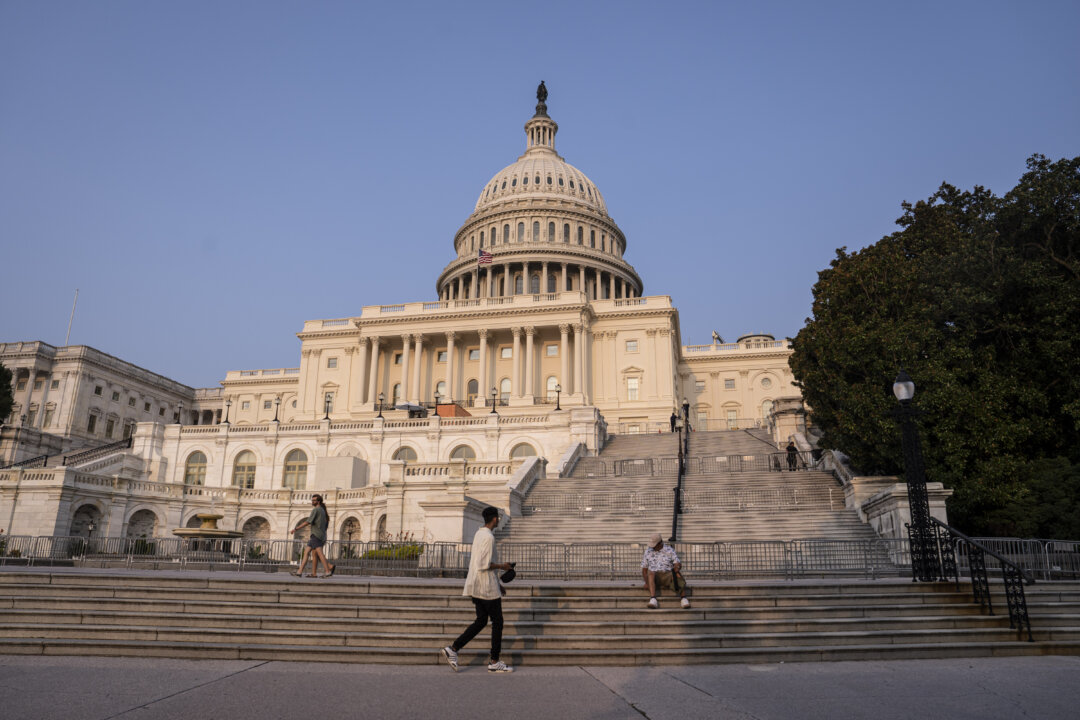Noncitizen voting, threats to election officials, and voter roll cleanup were some of the issues discussed at a recent hearing before Congress.
Fifty-five days before the Nov. 5 general election, six secretaries of state from around the country told a congressional committee that they have made progress in securing elections but more federal funding is required to fix some remaining problems.
The election chiefs described to the House Committee on Administration the successes they have achieved in cleaning up the voter rolls.
Michigan Secretary of State Jocelyn Benson, a Democrat, testified under oath that, as of March, the Bureau of Elections and local clerks have canceled 800,000 registrations, including those of 532,513 deceased individuals.
The Michigan Department of State’s online voter information page shows that 345,951 inactive voter registrations are slated for cancellation in 2025, with another 269,404 names scheduled to be dropped in 2027.
According to the site, Michigan has 8.4 million registered voters.
Florida Secretary of State Cord Byrd, a Republican, testified that, since 2022, 1 million of his state’s 13.5 million registered voters have either been removed from the rolls or changed to inactive status.
“Properly maintained voter rolls are essential to building confidence in the outcome of an election,” he said.
Arizona Secretary of State Adrian Fontes, a Democrat, reported that, since 2020, his state has deactivated roughly 1 million registrations and canceled 724,000 others.
As of July 2024, Arizona had 4.1 million registered voters.
Concerns About Noncitizens Voting
The names of noncitizens appearing on state voter rolls was a great cause of alarm to some of the witnesses and little concern to others.
Ohio Secretary of State Frank LaRose, a Republican, told the committee that many Ohio voters are upset about the discovery of noncitizens registered and voting in their elections.
“We keep it rare by enforcing the law. The 600 we found on the rolls were removed and referred for prosecution,” he said.
LaRose testified that there are two important citizenship status databases that the federal government is unwilling to provide to the secretaries of state.
“It’s essential that the Biden-Harris administration grant us access to all federal database records necessary for these investigations, which they have yet to do,” he said.
According to LaRose, 135 noncitizens voted in recent Ohio elections.
“The lack of border security compounds the problem,” he said.
On Sept. 9, Byrd of Florida wrote a demand letter to the U.S. Citizenship and Immigration Service, requesting that up-to-date citizenship information be provided to help the state ensure that noncitizens are not voting. He said if the agency did not respond, Florida would sue for access.

In August, the Florida Department of State initiated actions to remove 144 noncitizens from the voter rolls.
According to Byrd, all were verified by the state to be noncitizens through the federal government’s Systematic Alien Verification for Entitlements (SAVE) program—a system he deemed “insufficient.”
Byrd included in his letter the names of seven additional suspected noncitizens whose names appeared on the voter rolls but whose status could not be verified through SAVE.
While Florida and Ohio are demanding the federal government help them ensure that noncitizens do not vote this November, Benson told the committee that there is “no evidence” of noncitizens voting.
New Mexico Secretary of State Maggie Toulouse Oliver testified, “Noncitizen voting simply does not happen in any systematic way in New Mexico or in the nation more broadly,” she said.
Despite these facts, “Voters believe noncitizen voting does occur, and this impacts their overall confidence in elections,” she said.
Arizona’s Fontes testified that if a noncitizen uses a federal voter registration form—a process in which voters are not required to show proof of citizenship and where a signed attestation is sufficient—the noncitizen can vote in federal elections but not state elections.
According to Fontes, there are 44,000 federal-only voters in Arizona.
He said that the effort to rectify the situation is complicated and may “reduce the capacity of some U.S. citizens to vote.”
Fontes explained that 44,000 federal voters made up a small fraction of Arizona’s 4.1 million registered voters, and cautioned that “paranoia around a fake problem” can lead to the disenfranchisement of some qualified voters.
In 2020, Joe Biden defeated Donald Trump in the state by 10,457 votes.
Transparency Varies
Transparency in the conduct of elections and voter roll management was a topic that highlighted some differences between the states.
LaRose said that Ohio publishes data related to voter list maintenance “so private citizens can crowdsource and analyze the data for themselves.”
“Everything is transparent and visible. We let people know what we are doing to maintain voter lists.”
On the other hand, the Michigan Bureau of Elections does not divulge the details of its list maintenance plans and methods, and has fought a multi-year legal battle with the Public Interest Legal Foundation to keep from disclosing them.
In reference to a 2020 incident at the vote counting center in the city of Detroit, in which observers were ejected from the counting room and election workers taped cardboard to the windows to prevent them from looking in, Byrd said that in Florida, “There are no pizza boxes, and you don’t need binoculars to view our elections. Every part of the process is open to the public … We want to encourage people to watch how their ballot becomes a vote.”
Foreign and Domestic Election Interference
Fontes told the committee that foreign actors from Iran, China, and Russia are poised to exploit any security gap in the U.S. elections. He described an incident where a bad actor using artificial intelligence created a convincing impersonation of him using artificial intelligence.
“It was near impossible to discern it wasn’t really me.”

Fontes worried that such schemes could be used to spread bogus election information to the public. He said he favors federal legislation to require any political ad using AI to post a clear declaration in the content that it is being employed.
Benson expressed concern about what she called “unprecedented threats to our election system … from highly sophisticated, foreign-government-aligned entities.”
Oliver of New Mexico testified that “combating nation states” attempting to interfere in elections is an important priority for her office and requested more federal funding to help in the effort.
LaRose stated that millions of dollars of foreign money had been filtering into Ohio politics and influencing elections until Gov.Mike DeWine, a Republican, signed a bill prohibiting foreign donations.
West Virginia Secretary of State Mac Warner, a Republican, testified that his office is cooperating with Marshall University’s Institute for Cyber Security to safeguard the election infrastructure of the state’s 55 counties against cyberattacks.
However, Warner said he was also worried that the hard work put in by state and local election officials is “at serious risk from [domestic] bad actors who attempt to use our government to tip the scales in favor of a candidate or political party.”
Warner also cited implementation of election procedures by state executive branch officials without legislative approval as improper interference in the 2020 election.
“Don’t let consent decrees overrule state law,” Warner said.
Harassment of Election Workers
Benson of Michigan testified that election officials continue to “endure threats, harassment, false and malicious attacks on our character and integrity.”
“We cannot have a secure democracy if we do not protect the security of the people who administer our elections.”
Benson blamed “lies” and “unsubstantiated rhetoric” about the security and accuracy of elections for the hostile work environment.
Oliver of New Mexico stated that false election claims and ideological attempts to discredit voting processes are “now colored by conspiracies, misinformation, and outright lies.”
Oliver said the false information leads to increased threats and harassment of election workers, and sometimes “political violence.”
An already difficult situation is compounded by what Oliver called “frivolous and burdensome public information requests.”
Benson, Oliver, and Fontes each testified that more federal funding for elections is needed, with Fontes urging the committee, “We implore you … to fund elections.”
According to Benson’s office, Michigan currently spends approximately $100 million a year to run elections, and is requesting $30 million to $45 million more for further security and access measures like security for ballot drop boxes.
LaRose of Ohio said that an extension of the retention time for federal and state election records would help ensure accurate elections. He also urged states to follow Ohio’s lead in taking steps to make certain that adequate quantities of necessary election supplies are on hand at every polling place.
Committee Members Weigh In
Committee Chairman Bryan Steil (R-Wis.) urged passage by the Senate of the Safeguard American Voter Eligibility (SAVE) Act, which would require proof of U.S. citizenship to vote. The House version passed on July 10, 2024.
Ranking Member Joe Morelle (D-N.Y.) spoke of one jurisdiction that experienced a 600 percent increase in threats to election officials.
Rep. Greg Murphy (R-N.C.) commented that threats to members of Congress have increased “300 to 400” percent.
Rep. Derek Kilmer (D-Wash.) worried that there has been inadequate election planning to deal with a hypothetical mass casualty event that could potentially take out hundreds of members of Congress, thereby paralyzing the federal government.
Rep. Norma Torres (D-Calif.) told the hearing that election workers have seen a rise in dangerous threats and harassment because of constant misinformation and disinformation.
Congressman Anthony D’Esposito (R-N.Y.) criticized the idea that the number of noncitizens voting in elections is insignificant.
“Many elections come down to just dozens of votes,” he said.

